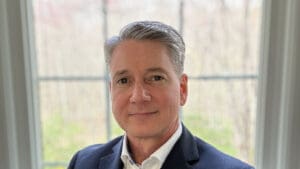Chris Finerty, retired General Officer, has dedicated more than three decades to the United States Air Force, the Air National Guard, and the Department of Defense.
His career journey spans operational flying, combat deployments, and high-stakes legislative roles at the Pentagon, where he advised Secretaries of the Air Force and Chiefs of Staff. He has commanded large teams, navigated complex policy issues, and built critical bridges between Congress and the Department of Defense.
Today, Finerty reflects on the mentors who shaped his outlook, the lessons he worked to pass on, and the leadership principles that guided him through some of the nation’s most demanding environments.
Over the course of your 30+ years in service, who has been the most influential mentor in your military or legislative career, and what lasting lessons did they teach you?
The person who had the most significant impact on me was not a personal mentor in the traditional sense but a presenter I heard in college. The speaker’s message was about “doing the right thing.” As the talk unfolded, I became increasingly aware of the difference between doing what is legal and doing what is right. Following regulations and staying out of trouble are worthwhile goals, but they are not the same as acting ethically. That distinction was invaluable. Too often in the military, we consider ourselves ethical if we simply follow the rules, but blindly following regulations can sometimes lead to unethical outcomes. I was fortunate to hear that presentation early in my career, and it stayed with me for decades. I tried to remind myself often that regulations alone do not define ethics.
Having led large, diverse teams at the Pentagon and in the Air National Guard, how do you approach mentoring officers, staff, and future leaders within your organization?
I have always tried to be honest about the mistakes I made and give others a perspective on what I could have done differently and why. Too many leaders want to project an image of perfection, as if they have never made an error. People can usually see through that. Mentorship only works if the other person believes you are genuine. For me, being genuine meant being open about both my faults and my accomplishments. By doing that, I created trust, which is the foundation of any meaningful mentoring relationship.
Was there a particular piece of advice during your transition from operational flying to senior legislative liaison roles that significantly shaped your career path?
Yes. I quickly realized that the military way of solving problems is not the only way. Dealing with Congress was a crash course in understanding that. The military is built on hierarchy, strict process, and adherence to regulation. Congress works very differently. Every member has one vote, relationships matter as much as process, and the rules are far more flexible. Once I understood that, I gained empathy for how Congress operates. That perspective made me a more effective liaison and helped me bridge two very different professional cultures.
You’ve worked across multiple communities — Congress, the Department of Defense, the intelligence community, and the National Guard. How do you cultivate relationships with mentors and mentees in such complex environments?
Everyone is busy, so you have to be intentional about making time to engage. Scheduled mentoring sessions can be practical, but often, you take the time you can get. Sometimes it is before or after a meeting, or at the end of a phone call. When those opportunities come, clarity and conciseness matter. Being able to ask for or offer guidance within a short window is clearly critical. I learned to take advantage of even brief interactions to build lasting relationships.
When you look for a mentor or advisor, what qualities stand out to you as most valuable in navigating high-stakes decision-making with Congress and senior defense leaders?
The two qualities that stand out are genuine sincerity and credibility. If the advice I am getting is genuinely in the best interest of the situation, not just what benefits the person giving it, then I value it. Similarly, if I seek advice for myself, I need to know that the person is considering my perspective and not simply the institution’s. Public service is about sacrifice, but sometimes that expectation is taken too far, and we forget that the institution itself has no loyalty to us or our families. That is why sincerity and credibility are so important.
As your career progressed from pilot to Major General, how did your mentoring style evolve to meet the needs of both junior officers and senior executives?
My approach has always been based on sincerity and credibility. Those never changed. What did change was the content of my advice. Early in my career, the conversations were more tactical and operational. Later, they involved legislative strategy, organizational leadership, and decision-making at the national level. But in every stage, I tried never to give advice when I had none to offer. Sometimes the most credible thing you can say as a mentor is, “I don’t know.” That humility builds more trust than trying to answer every question.
What role has mentoring played in shaping your professional development and personal resilience, especially during high-pressure assignments like Congressional hearings and confirmation processes?
I never had a formal mentor. Instead, I learned from the people I worked for, worked with, and those who worked for me. Whenever I heard an unusual or interesting idea, I would ask the person how they reached that conclusion. The thought process behind an idea was more valuable to me than the idea itself. That curiosity guided my professional development. Mentoring made me more resilient because I could draw from a wide range of perspectives when navigating the intense pressure of hearings and confirmation processes.
When identifying potential mentees in the military or legislative context, what qualities signal to you that someone has the capacity to grow into a strong leader?
Two qualities stand out. The first is the ability to admit when you don’t know or don’t understand something. The second is openness to solving problems in more than one way. The military is famous for rewarding the opposite: hiding ignorance and assuming the military way is the only way. Those habits stifle growth. Leaders who can acknowledge gaps and remain open to alternative approaches are the ones who ultimately develop into strong, adaptable leaders.
Looking back on your leadership journey — from combat missions to representing the Air Force before Congress — what’s been the most rewarding aspect of serving as a mentor?
Without hesitation, it was in combat and life-or-death situations. Watching those I had the privilege to mentor accomplish the mission, save lives, and return home safely was the most rewarding experience of my career. Knowing you played a part in shaping their skills and confidence in those moments is something that stays with you forever.
Many of your past mentors and colleagues now hold influential positions within the defense and government sectors. How do you stay connected with them and continue to learn from those relationships today?
Staying connected requires effort, especially as everyone assumes different roles and responsibilities. I reach out when I can, whether it is a short message, a phone call, or a meeting at a professional event. The relationships built over years of service are invaluable. They continue to shape my perspective, and I hope to offer them the same. The learning never really ends, and staying engaged with colleagues ensures that mentorship remains a two-way exchange.
Closing Reflections
reflects a rare balance of operational experience and legislative expertise. From flying missions overseas and saving lives in combat to leading strategic engagement with Congress on budgets exceeding $200 billion, his leadership was grounded in authenticity and guided by a clear moral compass. His reflections on mentorship reveal a leader who valued sincerity over image, credibility over appearances, and curiosity over complacency. For those seeking to lead in environments where the stakes are high and the pressures immense, Finerty’s message is clear: doing the right thing is not always the same as following the rules, and authentic leadership lies in the humility to admit mistakes, the courage to stay genuine, and the willingness to learn from everyone around you.






